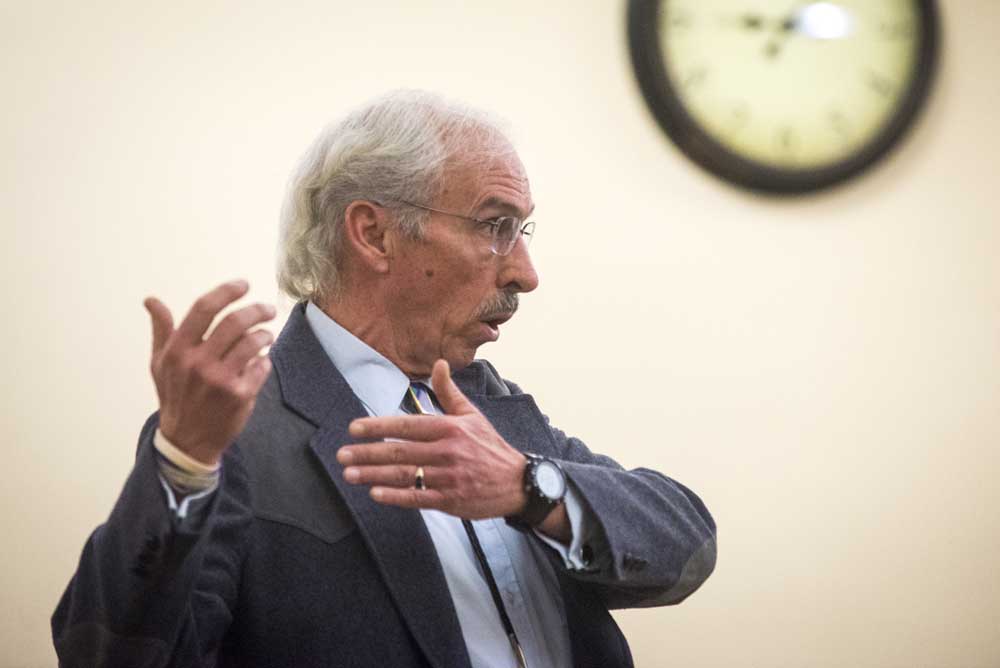Chief deputy to run for DA
Published 3:30 am Friday, January 5, 2018

- Prosecutor Ron Brown makes an argument during a court hearing in 2015.
When Clatsop County Chief Deputy District Attorney Ron Brown interviewed for his job in 2003, he may also have been auditioning for his next one.
During the interview, District Attorney Josh Marquis asked him if he would be interested in being the county’s top prosecutor. After a startled Brown double-checked to ensure he was still discussing the right position, Marquis confirmed that he was.
More than a decade later, Brown may finally have his chance. He will file to run in the May election for district attorney following Marquis’ announcement he will not seek another term.
“I feel like I want to continue on with a lot of things that Josh has done, and I want to add to a lot of things that Josh has already done,” Brown said. “He and I see eye to eye on virtually — just about — anything I can think of. There’s just a little bit of work that I’d like to try to do on my own and to take on the challenge.”
Marquis has also offered Brown his endorsement.
“He has the respect and admiration of the office because of his toughness at trial and his deep commitment to victims,” Marquis wrote in a guest column for The Daily Astorian.
The resumes of Marquis, 65, and Brown, 63, often intersect. Both studied law at the University of Oregon in the late 1970s and dabbled in criminal defense law between prosecutorial stints in Lincoln, Deschutes and Lane counties.
“Even when I was a young criminal defense lawyer, in a lot of cases, I felt strongly toward the prosecution side of things,” Brown said. “A lot of times my job was not to get my client off, because my client was dead in the water. It was to try to get him the best plea bargain I could get, and that was not a very satisfying thing just to get the best deal for you on your DUII or whatever type of case.”
Despite the district attorney’s office’s tough-on-crime reputation in recent decades, it seeks only the just — not the maximum — sentences, Brown said.
“When I was younger, it seems like you’re more interested in your batting average in terms of how many wins and how many losses that you have in terms of cases and how much you’re crushing the other side in court,” he said. “The older I’ve gotten, I’ve seen it’s not nearly as black and white as that. I just like to make a difference on a personal level, and I think I’m getting more satisfaction out of that than I ever have.”
One near-death experience in 2002 may have shifted Brown’s thinking. As a chief deputy in Crook County, Brown, his wife Tiffany — now the Clatsop County emergency manager — and their three young children had to flee their home one morning. A man Brown had prosecuted for several misdemeanors had attempted to burn his house down.
“That was a king-size bummer,” Brown said. “We were all having a tough time sleeping for a long time.”
Nathan Wayne Galloway — 19 at the time of the fire — was convicted of arson, attempted aggravated murder and first-degree burglary and sentenced to roughly 20 years in prison.
The ordeal allowed Brown, who carries a handgun after receiving death threats in a separate case, to view prosecution from the victim’s point of view.
“His commitment to victims in homicide and sexual assault cases makes him a ‘working DA,’ the kind voters in this county have every right to expect,” Marquis said.
Brown has not, though, experienced the worst type of crime for victims who live to see a court case unfold.
“There’s probably no more messed up thing in your life than to be sexually abused,” Brown said. “Your victims in murder abuse cases are people you never meet. You have to work with a live victim, obviously, and you develop a real rapport with certain kinds of victims.”
The district attorney’s office may see some expansion in that area. Brown has proposed adding a mentor program to the victim’s services unit that would connect past survivors with current ones during and after court cases.
“Actual victims can maybe even relate better to what a victim is going through than the family members,” Brown said.
Brown’s plans may also include advocacy for expanded specialty courts. The Circuit Court already conducts mental health and drug court hearings, but Brown suggested adding treatment for veterans as well.
“I don’t know whether we’ve got enough veterans in the area to warrant a whole court for them, because there’s only so many specialty courts that we have time for or room for, but I’d be open to that.”
In his campaign, Brown will likely stress experience as his key selling point.
“I live here. I’m familiar with all of the issues in the community as far as the biggest types of crime, the biggest things that we need to try to educate people about, and I’m the most qualified right now,” Brown said. “If you want somebody to take a case in and try it, I’m the most experienced person around.”
Among the new district attorney’s largest challenges, Marquis said, will be the state’s move toward diverting money away from incarceration and a high release rate at the overcrowded county jail.
“The state is being dominated by people who do not believe people should go to prison,” Marquis said. “I think that’s going to be a challenge for the new DA that I didn’t have to deal with.”
David Rogers, the executive director of the American Civil Liberties Union of Oregon, is hopeful that leadership turnover will lead to reforms.
“This is an opportunity to not only get to know where the candidates stand, but this is also an opportunity to see improvement and change within the criminal justice system,” Rogers said. “There’s a lot riding on this.”
Should he be elected, the job would “absolutely” be his last, Brown said.
“I just think it’s time,” he said. “It’s time for me, and it’s time for the office.”





